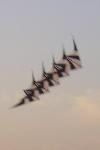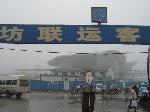- Getting around Lijiang. Dont stay in the Old Towns more than 2 days, there is nothing to do. KRISS Oct 9, 2013 05:46
- 2013 Beijing Temple Fair BENNYLAU Feb 26, 2013 03:29
- Malaysian traveling from KUL - LAX vis Shanghai PVG ZATI_DY Jan 3, 2013 20:15
Wings of War and Peace
- Views: 3663
- |Vote: 0 0
- |Add to Favorites
- |Recommend to Friends
Each spring the wings of hundreds of peaceful and multifarious kites compete for airspace in the sky above city. But there was a time when the wings over Weifeng were not so quiet or peaceful. The city, in the center of the Shandong Peninsular was once the site of a Japanese POW camp in Japanese occupied China during WWII. Later, Weifeng’s liberation was delivered on the wings of US Airforce B24’s - dropping men and supplies into the camp on August 17th 1945 thus ending more than three years internment for the foreign nationals in the camp.
I stood up for the third or forth time to stretch my back and legs and this time made my way to the entrance of the waiting room to take another look outside. It was almost dawn. How did I know this? Just the simple fact that the sun rises about this time everyday - there would be no brilliant sunrise to herald in the day. Instead Weifeng languished under the same gray pall of smog or fog that had held Beijing captive since the rains had stopped. I wondered if I would see the sky at all. The few concrete stairs down to the street were littered with people and their belongings – waiting, sleeping, chatting, eating or just staring blankly through the gloomy light.
It was hard to tell which of us had spent a more uncomfortable night – them or me? Inside where access was denied to those without a ticket – I was an exception and none dared question the foreigner it seemed – I had tried making myself comfortable lounging on my backpack. All through those sluggish morning hours a small but steady stream of passengers passed through to board an invisible stream of trains that stopped – each announced with the harsh clang of metal on metal as the staff banged the security fences at the entrance of the platform to attract the attention of any passenger who may have fallen asleep. They sure got mine every time and I was only waiting for the dawn.
When I bought my ticket in Beijing on the previous Friday I had no idea what time the train would arrive. I’d just been happy to buy a soft sleeper ticket for the day after my preferred departure date on what was clearly an extra train - destination Qingdao on the south coast of the Shandong Peninsular. There had been no long queue, no jostling for tickets at the counter, and no English spoken by the very polite middle-aged clerk who patiently fielded my many queries about trains, schedules and destinations as I stumbled with his language. Standing outside on the hot sun I discovered that my departure time was mid-afternoon. I correctly guessed - but hoped that I was wrong - that my arrival would be sometime during the graveyard shift, those ungodly hours from midnight till dawn.
My plan had been get good nights sleep, arriving fresh and relaxed, sightsee the city in the early morning, and catch a bus later in the day for the three-hour journey to the coast. But here I was waiting yet again, rested but having slept little, so by dawn I was in no mood to sight see in a town that seemed to offer little to see. What I had really come to see would be hard to find. I had discovered much to my dismay that I had left my research information back in my suitcases in Chongqing and I would be searching simply from memory and good fortune neither of which could be relied upon.
Waiting is an inevitable part of life and especially traveling and often the rewards are worth the time but after five long, uncomfortable hours waiting for this dreary dawn I no expectations and I was ready to leave on the first bus out of town that I could find. First impressions aside – and they were not good – I would at least give the city the benefit of the light of day before I made that decision. I, at least had a choice about when I could leave. Not like the many other foreigners who found themselves imprisoned here almost sixty years before. Between snatches of sleep, people watching and eating snacks my thoughts drifted to the stories I had read of people who’d once spent the war years waiting in it out in Weifeng. As prisoners of war they’d had no choice. I’d only spent these last five hours – a blink of an eye in comparison – sitting on a row of hard plastic seats against the wall of a shed in what passed as Weifeng’s railway station waiting room. Over 1500 ex-pats spent more than three years confined in relatively close quarters, often with strangers waiting for their chance to leave.
I was hoping to visit the place that for the majority of them had been far less comfortable than my present predicament. The place they all called home was originally a mission compound taken over by the Japanese after their invasion of northern China. The Japanese had been on the Shandong Peninsular since 1937 and life remained relatively normal for Americans and the British, still considered “neutrals’ until Japan bombed Pearl Harbour. Foreign nationals from more than twenty nations, almost one third of them children, and many of whom were at boarding school in Chefoo on the north coast of Shandong spent those war years here under Japanese civil supervision. A place of relative comfort compared with life for the Chinese, but prisoners non the less, they lived in extremely cramped conditions, making the best of their deprivations.
A friend of mine, her father the doctor at the boarding school, was born months earlier in the smaller POW camp in Chefoo. In the summer of 1943 when she was just six moths old, her family was amongst four hundred odd Chefoo prisoners who were transferred by leaky boat to Qingdao and then by train to swell the numbers in Weixian as Weifeng was formerly known. This unlikely mix of students, teachers, missionaries, merchants, musicians, businessmen and diplomats spent the next two years ‘waiting’ for the end of the war. Eric Liddell, "The Flying Scotsman" as he was affectionately known after unexpectedly winning the 400m Gold Medal at the 1924 Olympics was just one of the internees. During his time in the camp he taught math and supervised sporting activities as well as encouraging other internees. He was born in China the land he now called home and died shortly after his birthday just months before the camps liberation.
A former student of the Chefoo boarding school was one of seven paratroopers who from wings of peace were dropped from the skies over Weifeng in August 1945 to bring the prisoners news of the end of the war and take over supervision from the Japanese. These days’ wings of a different kind caste shadows over Weifeng. Colourful kites have replaced parachutes and planes as the city plays host to the popular and spectacular International Kite Festival. Each April for more than 20 years this Festival has been attracting a growing number of kite enthusiasts from both home and abroad.
As dawn broke I wandered outside for the last time to take stock of my surroundings again and it still didn’t look good. Back behind me was the grand new train station. I had glimpsed it earlier as I left the platform in the wee small hours – all plate glass and steel, under construction and still months away from completion. If I ever returned to Weifeng, the ‘waiting’ would surely be more comfortable, even a pleasure but all my joy had dissipated like the night before the dawn. Across the street was a row of small shops was waking up beside ‘hole in the wall’ eateries, and a few buses and taxis crowded the bend in the narrow potholed street. As I looked around for the ‘city’ there was little clue as to its whereabouts.
Visibility was still poor, as was the condition of this suburb clearly on the outskirts of town. Weifeng was definitely out there, along with a memorial to Eric Liddell in the grounds of the old mission, which is today the Number 2 Middle School of Weifeng. Like almost every city in China Weifeng is undergoing massive renovations and revitalizations, no doubt to impress the many visitors who wing their way into Weifeng each year filling the sky with wings during the Kite Festival. As my bus cruised smoothly along broad new boulevards, passing beautiful open parklands I wondered if I had been too harsh and hasty in my judgments but I resolved to come again another time - a time when Weifeng was not waiting for things to end – a time when I might enjoy those colourful wings of peace.





 Copyright © 1998-2025 All rights reserved.
Copyright © 1998-2025 All rights reserved.
1.
Mar 16, 2007 22:23 Reply
LEMONCACTUS said:
a great tale....well done for making it without your travel notes too!!